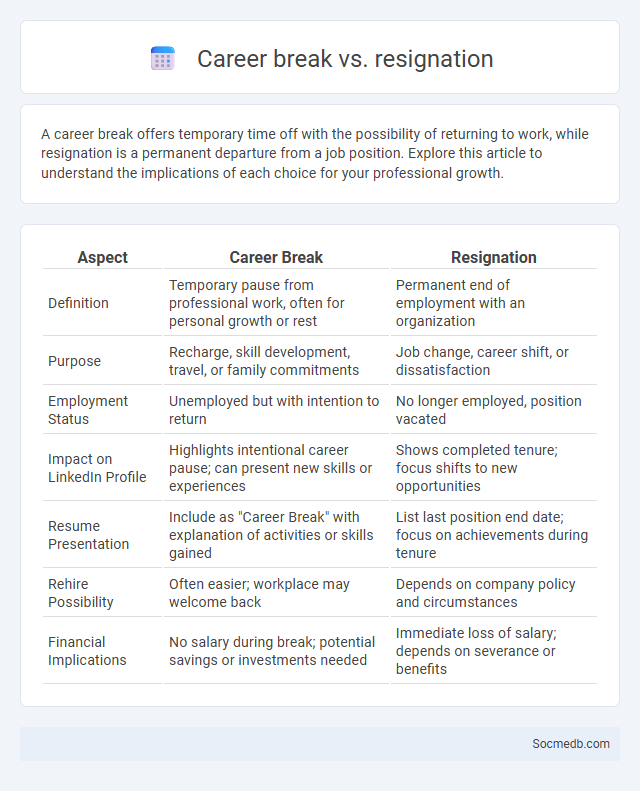
Photo illustration: Career break vs Resignation
A career break offers temporary time off with the possibility of returning to work, while resignation is a permanent departure from a job position. Explore this article to understand the implications of each choice for your professional growth.
Table of Comparison
| Aspect | Career Break | Resignation |
|---|---|---|
| Definition | Temporary pause from professional work, often for personal growth or rest | Permanent end of employment with an organization |
| Purpose | Recharge, skill development, travel, or family commitments | Job change, career shift, or dissatisfaction |
| Employment Status | Unemployed but with intention to return | No longer employed, position vacated |
| Impact on LinkedIn Profile | Highlights intentional career pause; can present new skills or experiences | Shows completed tenure; focus shifts to new opportunities |
| Resume Presentation | Include as "Career Break" with explanation of activities or skills gained | List last position end date; focus on achievements during tenure |
| Rehire Possibility | Often easier; workplace may welcome back | Depends on company policy and circumstances |
| Financial Implications | No salary during break; potential savings or investments needed | Immediate loss of salary; depends on severance or benefits |
Understanding Career Breaks vs Resignations
Career breaks involve temporarily stepping away from work for personal growth, education, or health, while resignations are permanent decisions to leave a job. Understanding the difference helps you communicate transparently on social media, maintaining your professional reputation and network. Clarifying these distinctions supports your career narrative and can influence future job opportunities.
Key Differences: Career Break and Resignation
Career breaks often involve a planned, temporary pause in professional activity, aimed at personal development, education, or caregiving, while resignation signifies a permanent decision to leave a job or career path. Social media platforms highlight career breaks as opportunities to showcase skill enhancement, networking, and personal growth, contrasting with resignation posts that typically focus on transition, gratitude, or new beginnings. The key difference lies in the intent and duration, with career breaks framed as a strategic intermission and resignation marked by a definitive exit.
Pros and Cons of Taking a Career Break
Taking a career break through social media can boost personal branding by showcasing skills and interests, attracting new opportunities in digital networking. However, prolonged absence may create gaps in professional experience, potentially raising concerns for future employers. Balancing active online presence with skill development during a break helps mitigate risks and maximizes the advantages of career growth.
Pros and Cons of Resignation
Resignation announced on social media can enhance transparency and foster supportive networks, enabling professionals to receive constructive feedback and job leads. However, public resignations may risk reputational damage, strained relationships with employers, and unintended professional consequences if not communicated tactfully. Balancing the openness of social platforms with privacy and professionalism is crucial to managing the impact of resignation announcements effectively.
Situations Suitable for a Career Break
Social media professionals often benefit from a career break during transitional life events such as pursuing advanced education, recovering from burnout, or relocating internationally. Strategic pauses enable skill refreshment, networking expansion, and staying updated with evolving platforms like TikTok and Instagram. Taking time off during these situations enhances long-term career growth and adaptability in the dynamic digital landscape.
When Is Resignation the Right Option?
Recognizing the signs that social media negatively impacts your mental health or career growth is crucial when determining if resignation is the right option. If your online presence leads to consistent stress, harassment, or ethical conflicts, stepping away can protect your well-being and professional reputation. Carefully evaluating your goals ensures your decision aligns with maintaining a positive digital footprint for Your future success.
Impact on Future Employment: Career Break vs Resignation
Taking a career break can positively impact your future employment by allowing you to acquire new skills, reflect on career goals, and avoid gaps in your resume, which can be appealing to hiring managers. Resignation, while sometimes necessary, may raise concerns for employers about job stability and commitment, depending on the reasons and how the transition is managed. Strategic communication about your career break versus resignation can influence perceptions and open doors to enhanced career opportunities.
Financial Considerations: Career Break vs Resignation
Taking a career break often means temporary loss of steady income but preserves access to benefits like health insurance or retirement plans, which can mitigate financial strain during time off. In contrast, resignation typically leads to immediate income cessation, potential loss of benefits, and may require reapplication for new benefits upon re-employment, increasing financial risk. Careful budgeting and consideration of severance pay, unemployment benefits, and emergency funds are crucial when deciding between a career break and resignation.
Employer Policies for Career Breaks and Resignations
Employer policies for career breaks and resignations on social media emphasize maintaining professionalism and confidentiality to protect both Your reputation and company interests. Clear guidelines outline acceptable content, prohibiting disclosure of sensitive information or negative comments about the employer during or after career breaks. Adhering to these policies ensures compliance with contractual obligations and safeguards Your future career opportunities.
Making the Right Choice: Career Break or Resignation
Choosing between a career break and resignation on social media impacts professional reputation and future job prospects. A career break signals intentional growth or personal development, maintaining network connections and leaving possibilities open. Resignation implies a definitive end, requiring strategic communication to preserve brand image and leverage online platforms for job searching.
 socmedb.com
socmedb.com